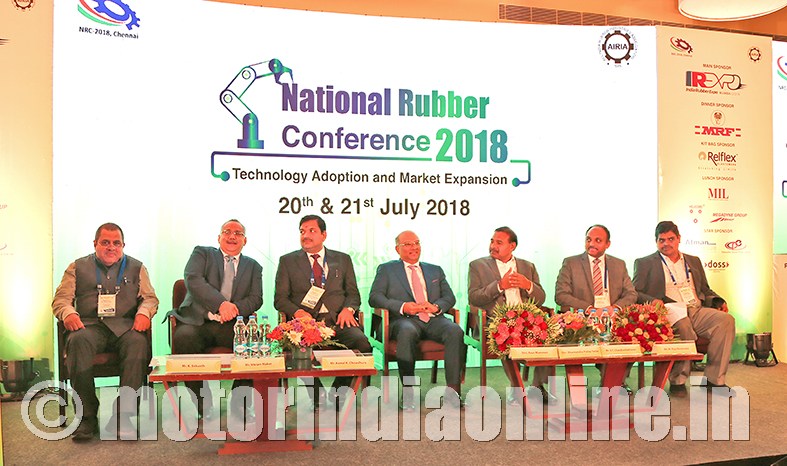The National Rubber Conference 2018 was successfully conducted by the All India Rubber Industries Association (AIRIA) in Chennai on July 20 and 21 with its theme ‘Technology adaptation and Market expansion’.

The Chief Guest at the inaugural function was Mr. Dharmendra Pratap Yadav, Secretary of the Micro, Small and Medium Enterprises (MSME), Department of Tamil Nadu, and the Guest of Honour was Mr. Arun Mammen, the Vice Chairman and the Managing Director of MRF Ltd.
Mr. Kamal K. Choudhary, AIRIA President, in his presidential address, said that technology is the foundation of modern business. “The advancement of technology is a catalyst for the improvement of India’s SMEs and for general economic development”.
Mr. Arun Mammen, in his address, elucidated how the indigenous tyre manufacturing companies dominate the local market and how a few companies export their products to around 18 countries. On the contrary, many non-tyre manufacturing companies have “closed their shutters.”
Hence, in order for the non-tyre producing firms to survive, Mr. Mammen suggested that they follow the steps of the tyre producers and engage in product upgradation with good R&D efforts. This would allow them to make changes to suit the customer’s needs.
The need of the hour is to usher in technological advancements, he added, while explaining the importance of holding the market against foreign multinational companies.
He also advised AIRIA to work for the development of the smaller rubber testing centres in order to ensure better tested quality rubber for every purpose.
Mr. Sandeep Dahiya, Director of Business Advisory Services, Ernst and Young, spoke on ‘the current and the future scenario of the automotive industry’ at one of the technical sessions, and pointed out that the automotive industry showed an unprecedented growth in 2017-18, with the export percentage however dropping for both passenger and commercial vehicles.
Speaking about the future of electric vehicles, he observed that there will be major changes in the automotive industry, such as a 30 or 40 per cent increase in the cost of an EV. Also, EVs could also be disruptive, as 80 per cent of the current components will become obsolete in due course.
Mr. Dahiya stressed the need for research in a systematic manner on how to leverage the current automotive components in order to use them for EVs. The new upcoming trends were the state-of-the-art 3D printing of automobile parts and the use of augmented reality.
A panel discussion on the electric vehicle technology and its future trends followed, with panelists, Mr. Sivam Sabesan, Managing Director of Charin EVs, Mr. Venkat Kirankumar, Head of Engines and Axles, Ashok Leyland, and Mr. Anand Raghavan, Divisional Manager of Portfolio Management of the EV Business Unit, Ashok Leyland, participating in it.
They explained that their studies showed that the cost of battery packs has been on a decline. From $1,000 per kilowatt hour (KWH) in 2010, the price came down to $225 per KWH in 2016. They predicted that by 2030 it would be just $100 per KWH. This will lead to a big increase in the number of EVs in India by 2030. In fact, there would be a total of 31 million EVs by 2040.
The conference concluded with the presentation of the Distinguished Service Medal, 2018, to Mr. K.T. Thomas, Director of Paragon Polymer Products Pvt. Ltd., by Mr. Vinod T. Simon, Chairman of the Rubber Skill Development Council (RSDC).
The Conference was attended by around 200 engineers, scientists and delegates from the rubber manufacturing industry in the southern region of the country.